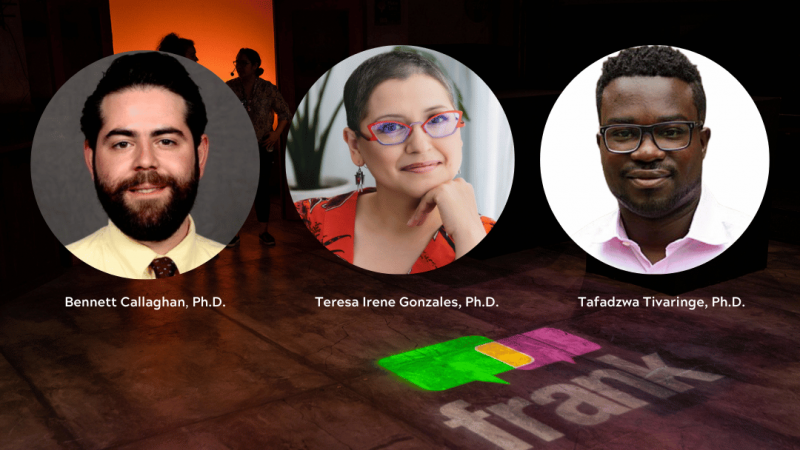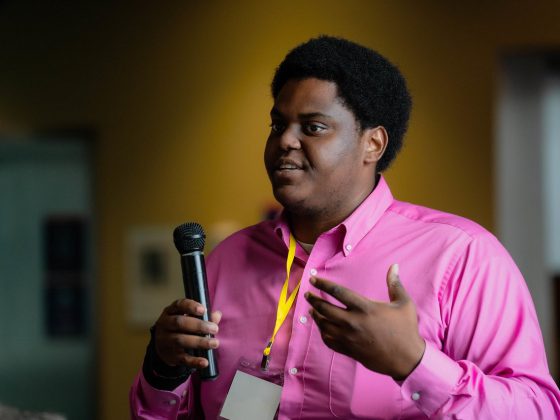A committee of scholars and practitioners working with the Center for Public Interest Communications at the University of Florida has selected three finalists for the annual Prize for Research in Public Interest Communications, which includes one $10,000 prize and two $1,500 prizes for peer-reviewed academic research that informs and advances the growing discipline of public interest communications.
The three finalists will present their work at frank, a gathering for social change communications practitioners, academics, philanthropists, business leaders and advocates who use strategic communication to drive social change. The gathering this year takes place in Gainesville, Fla., Feb. 14-17, 2023.
The changemakers attending frank will vote for the winner of the $10,000 prize. The finalists were selected from an applicant pool of 80 papers by a review committee of scholars and practitioners. Papers were considered based on their applicability to the field, contribution to public interest communications as an interdisciplinary academic discipline, methodological rigor and insight that can be used to innovate the social sector.
Meet the frank 2023 Prize for Research in Public Interest Communications finalists
Finalist papers are listed in alphabetic order of scholar presenting on behalf of the team at the gathering:
“Testing the efficacy of three informational interventions for reducing misperceptions of the Black-White wealth gap”
Authors: Bennett Callaghan Ph.D., Postdoctoral Researcher at Stone Center on Socio-Economic Inequality: the City University of New York and Leilah Harouni, Behavioral Scientist at Change Healthcare (presenting on behalf of the team); Cydney H. Dupree, Ph.D., Associate Professor at University College of London; Michael W. Kraus, Ph.D., Associate Professor at Yale University; Jennifer A. Richeson, Ph.D., Professor at Yale University
Application to practice: Narratives are important, but this research found that for some social issues with persistent misinformation, social science data is also important in shifting perspectives. This intervention-type study exposed a U.S. community sample to messages about Black–White racial inequality. Interventions including data on Black–White wealth inequality elicited higher estimates of that inequality that persisted for at least 18 months. The data interventions also increased acknowledgment of White Americans’ structural advantage and reduced beliefs in personal achievement as the remedy for racial inequality. In contrast, a narrative-based intervention, including information on a single Black family contending with racial inequality, did not shift inequality estimates or change respondents’ explanations. This study suggests that social science data can be used to create more realistic perceptions of racial inequality–a prerequisite to enacting equity-enhancing policy. While ample evidence indicates that narratives can shift people’s beliefs about racial inequality, messages that present concrete data may be necessary to penetrate what the study found to be a profound ignorance of the Black–White wealth gap.
“The Stories We Tell: Colorblind Racism, Classblindness, and Narrative Framing in the Rural Midwest”
Authors: Teresa Irene Gonzales, Ph.D., Assistant Professor of Sociology at Loyola University of Chicago (presenting on behalf of the team); Elizabeth M. Thissell, NOVA Community Organizer at Planned Parenthood Advocates of Virginia; Soumitra Thorat, Ph.D. student at King’s College London
Application to practice: Knowing the root of the problem is key to taking on entrenched racism and classism. This ethnographic research in a small Midwestern town showed that discursive frames that link class, race, place, and behavior negatively influence opportunities and perceptions of communities of color and poor white communities. Discursive frames are how people turn ideological narratives, or understandings of their surroundings, into local stories—and in this rural case study, the discursive frames operate to exclude marginalized populations and perpetuate marginalization. This research showed the importance of colorblindness and classblindness as factors that influence the personal bias that impedes local decision-makers ability to view broader social issues, such as race and class in the town, through a complex lens. For instance, town leaders often linked poverty and communities of color and, as a result, overlooked the concerns of these residents and the issues that affected them. Knowing that colorblindness and classblindness are important factors helps us in designing communications strategies to overcome them as barriers to social cohesion and belonging, poverty (including the suburbanization of poverty and growing rural poverty), civic engagement, and also for coalition building between poor whites, Latinas/os/xs, and African Americans, and others, to address ongoing social inequities.
“’This was 1976 reinvented’”: The role of framing in the development of a South African youth movement”
Authors: Tafadzwa Tivaringe, Ph.D., Associate Program Officer for The Spencer Foundation (presenting on behalf of the team); Ben Kirshner, Ph.D., Professor, Learning Sciences and Human Development, University of Colorado Boulder; and Jesica Siham Fernández, Ph.D., Assistant Professor, Department of Ethnic Studies, Santa Clara University, Santa Clara, California
Application to practice: This research sheds light on effective approaches to scaling up local organizing campaigns into regional or national-level campaigns. Their study identified the key dimensions by which young people in South Africa transformed their local struggles into a movement linking youth around a shared vision for equitable and high-quality education. Given the injustices and precarity facing masses of young people globally, this is an urgent moment for organizing groups to strengthen movement-building strategies. In particular, their research found focusing on the shared construction of collective action frames was a key element for movement building as the youth in their study found meaning and connection with ideological frames related to fairness and collective action. Study participants were also able to connect their movement with the shared history of movements of the past which made them commit more to their own movement. Their findings imply those building movements, especially those trying to scale up from local to national, should create opportunities to create shared construction of collective action frames and to connect movements to movements of the past.
The papers presented this year at frank 2023 represent the future of the field of public interest communications. The work shared was selected for its rigorous methodology and direct application to social change communications. The scholars are leaders within their own disciplines, which represent diverse perspectives, including social psychological, counseling psychology, and social movement studies. The insights from their presentations will help inform and innovate campaigns and initiatives designed to drive effective social change.
Find out more about past prize winners: 2022, 2021, 2020, 2019, 2018, 2017, 2016, 2015, 2014


